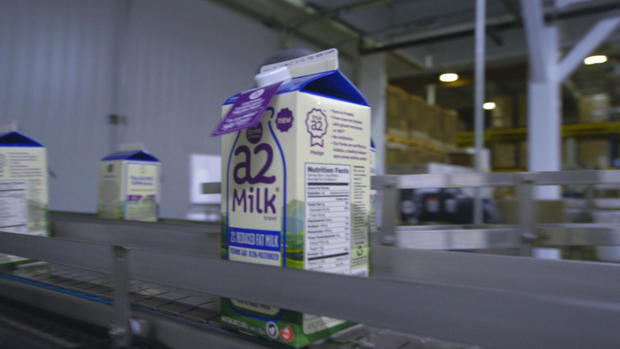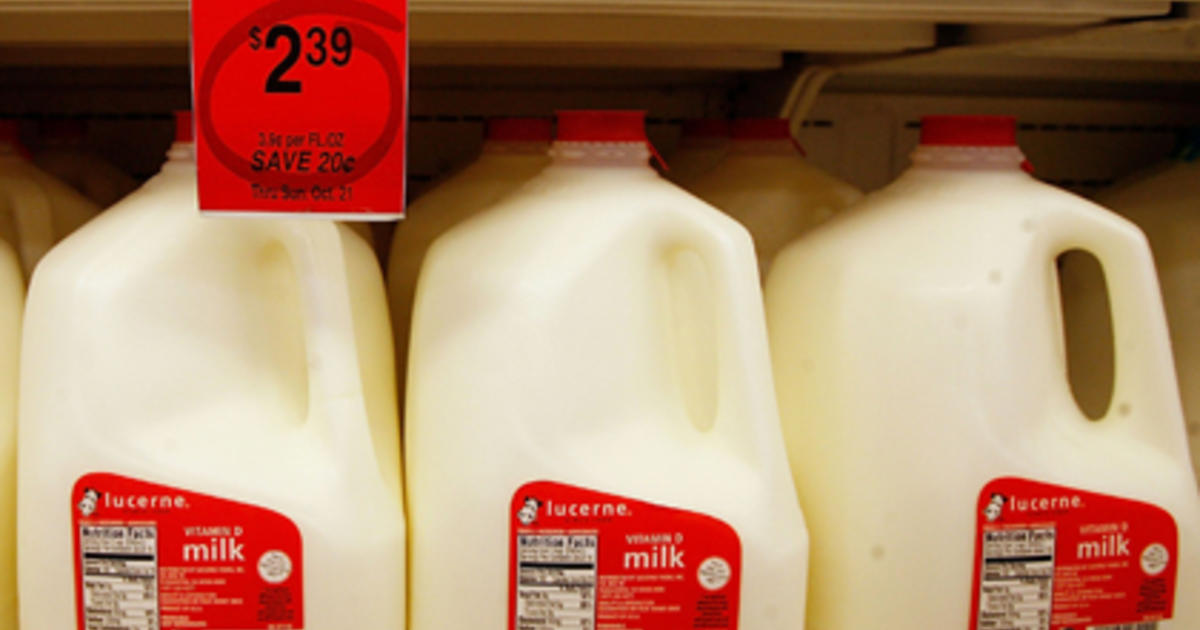Specialty product a2 Milk popular with consumers but not dairy industry
A special type of milk first developed in Australia is quickly catching on in the U.S. The makers of a2 Milk claim it's easier on the stomach than regular milk. It contains only A2 proteins while regular milk has both A1 and A2 proteins. People who find regular milk hard to digest say this is good news but the dairy industry isn't so sure.
At first glance, you might think a2 Milk is another plant-based drink like almond milk, but it's not. It is pure cow's milk, it has no special additives and it's not lactose-free. The difference is a type of protein found in the milk, and the makers say the difference can be life-changing.
Four years ago, Lisa Montesanti says her grandson Nicholas stopped drinking milk after being hit with severe stomach pain. But when he saw a commercial for a product called a2 Milk, he told his grandmother he wanted to try it.
"I got it for him and he has absolutely no problems when he drinks it," Montesanti said.
"There's A1 and there's A2. And we simply go and find the cows that only produce A2 proteins and that's what we have in our milk," explains Blake Waltrip, the chief executive of a2 Milk in the U.S.
He says that for some people it's the A1 protein that makes milk difficult to digest.
"More than likely, everything that we see points to the fact that that intolerance is to the A1 protein – not to lactose," Waltrip said.
A study funded by the a2 Milk company claims that when A1 proteins are broken down in the gut, they form a protein fragment called BCM-7 that triggers inflammation and symptoms like bloating and abdominal pain.
But the National Dairy Council says, at this point, a2 Milk's claims are purely theoretical and not backed by any scientific research.
"It's just a theory at this point in time. There's no science that really says that there's any value in this A2 protein relative to conventional milk. The two studies that were done were with a small number of subjects, looked at different variables that really don't give us the answers that we need to be able to tell whether or not this is really true or not," said Greg Miller, chief scientist for the National Dairy Council.
Some of the a2 Milk sold in stores is produced at Prairieland Dairy in Firth, Nebraska, where the milk from hundreds of cows that produce the A2 protein is collected.
Interestingly, the cows that produce a2 Milk are not genetically modified. To identify the ones producing the A2 protein, a simple DNA test is performed on newborn calves using a hair follicle.
They are then separated from the rest of the herd so there is no cross-contamination. The milk lines must be separate and cleaned thoroughly. Once bottled, the product must be tested again.
"The testing isn't cheap, but it's reflected in bringing this product to market," Waltrip said.
A2 milk is sold at a premium price – roughly $9 per gallon compared to around $5 per gallon for regular milk.
Dan Rice is the farm's owner. Despite skepticism from the dairy industry, Rice predicts that a2 Milk is the way of the future.
"I think the industry will eventually be all A2," Rice said.
But for now, the process is time consuming and costly. Despite the higher cost, Lisa Montesanti says she still doesn't feel milked for her money.
"I have recommended it to anybody who says they can't drink milk. I'll say try it. It's worth it," she said.
While the dairy industry doesn't think a2 Milk science is there yet, it says it welcomes innovation and promoting consumer choice.
For now, a2 Milk is mostly sold in specialty or high-end grocery stores, but the company says it expects to make a larger rollout in the near future.





